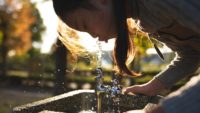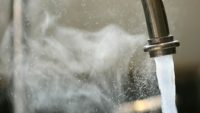Clean water is absolutely essential to the health and safety of people around the world. It’s something I’ve always known, but I have a much deeper understanding after my years of writing about the plumbing and HVAC industries. And one thing I’ve learned recently: You don’t truly appreciate indoor plumbing until you no longer have it.
The city where I live has commenced a water main replacement and pipe relining project in my neighborhood. The houses where I live were built in the 1950s, so it was a much-needed upgrade. However, being without running water for 11 hours a day for six days was, in a word, eye-opening. My neighbors were lucky as they left for work each of those days, while I currently work from home. We filled the bathtub every night before for the essentials, such as flushing the toilet. We also had a Gatorade cooler filled by the kitchen sink. The spout made it easier to wash our hands.
Thankfully, my situation was temporary. But it got me thinking about how many places are still without modern plumbing. It kind of blows my mind that people still struggle, going without, in this day and age.
The International Water, Sanitation and Hygiene Foundation (IWSH) presented IWSH Awards to Milwaukee School of Engineering students Kathryn Ashley and Sarah Ceurvorst for their work in testing and troubleshooting two prototype handwashing units, which helped reduce weight and production costs and improve mobility of the units.

According to UNICEF and the World Health Organization, one in three people globally do not have access to safe drinking water. Per a 2019 report, some 2.2 billion people around the world do not have safely managed drinking water services, 4.2 billion do not have safely managed sanitation services and 3 billion lack basic handwashing facilities.
And it’s not just third-world countries we’re talking about here. More than 2 million Americans do not have running water and sanitation according to a report: “Closing the Water Gap in the United States.” Navajo Nation is one such place. In fact, Native American households are 19 times as likely as white households to lack indoor plumbing; blacks and Latinos are twice as likely the report states.
However, there are many industry organizations working to fix this problem. One of them is the International Water, Sanitation and Hygiene Foundation (IWSH). During IAPMO’s 92nd annual Education and Business Conference, held virtually Sept. 27-30, IWSH presented two IWSH Awards to Milwaukee School of Engineering students Kathryn Ashley and Sarah Ceurvorst.
The women led a range of key testing and troubleshooting activities on two unique prototype handwashing units, originally designed by IWSH and DigDeep staff, and built during winter 2020 in collaboration with UA Local 400 in Kaukauna, Wisconsin. Their contributions to the inaugural Wash Station Challenge helped reduce the weight and product cost and improve mobility of the two prototypes before a finalized design went forward to be built at 10 separate UA Locals located across the U.S. this past June and July. As a result, 21 mobile wash stations were built and shipped to the Navajo Nation, where they are being deployed by the DigDeep Navajo Water Project to provide community handwashing capacity.
Very cool, ladies. Well done!
Since its founding in 2916, IWSH has brought together volunteers from all over the world to design and construct projects that improve access to water, sanitation and hygiene for communities in need in Rwanda, South Africa, Zambia, India, Indonesia, Nepal and the United States.
IWSH depends on volunteers and donations to complete its mission. Engineers are needed to help design or refine projects. Please consider donating your time or even opening your wallet. Remember, plumbing is vital to global health. For more information, visit www.iwsh.org.




